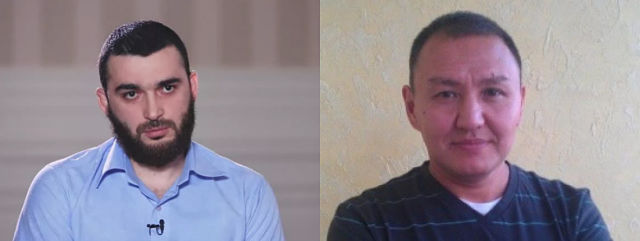In a week filled with important news of global and national significance, the issue of the week that we believe should be of utmost importance to Muslims in Russia is the recent media and public breakthrough regarding their most prominent activists – Dagestani journalist and educator Abdulmumin Gadjiev and Bashkir politician and former leader of the “Nation of Islam” movement (created with the support of Geydar Jemal) Ayrat Dilmukhamedov.
For Abdulmumin Gadjiev, the breakthrough came in the form of a collective video appeal in his support by leading Russian journalists, after which more than 70 people in Moscow took turns picketing the Dagestani mission to demand his release. Duma deputy Sergei Shargunov then sent an official request to the Prosecutor General’s Office demanding an investigation into the legality of the case against the detained journalist. As usual, Kremlin spokesman Dmitry Peskov was forced to respond in a formal manner during his communication with journalists, expressing confidence that the Prosecutor General’s Office would thoroughly investigate the matter.
This week also saw a breakthrough in the federal media’s attention to the case of Ayrat Dilmukhamedov. First, he was briefly mentioned in an article in “Novaya Gazeta”. Then a detailed article about him was published on the Media.Zone website. And finally, on Echo of Moscow, Maxim Shevchenko spoke in support of Ayrat Dilmukhamedov, saying that his defense should be a matter of the whole country, not just Bashkortostan, and Victor Shenderovich called him the most prominent political prisoner in contemporary Russia. The Permanent Commission on the Mass Media of the Human Rights Council also condemned Dilmukhamedov’s arrest.
Of course, many will dismiss all this skeptically, saying that it doesn’t change anything if both Gadjiev and Dilmukhamedov remain in prison despite these appeals and face long sentences. No, it changes a lot, because when the fate of an accused or imprisoned person is in the public eye, law enforcement agencies act more cautiously than in situations where their victims remain in obscurity. As for the possibility of changing the outcome of a case under social pressure, the case of Ivan Golunov has shown that it is possible with sufficient pressure. The well-known case of the Khachaturyan sisters, accused of murdering their abusive father, which was changed this week from murder to excessive self-defense under pressure from feminists and human rights activists, also demonstrates this.
Another important aspect of this problem is that both Gadzhiev and Dilmukhamedov represent only the tip of the iceberg of political prisoners among Russian Muslims. This is not limited to Muslims alone – political prisoners in Russia are increasingly common among other religious groups, such as Jehovah’s Witnesses or Protestants, who are also persecuted just as harshly. Whether we like it or not, it is impossible to pay equal attention to all of them, so attention is usually focused on the best-known and most authoritative representatives of these groups, who then draw attention to their lesser-known colleagues.
In any case, we can no longer claim that the Russian opposition and media elite only notice the persecution of liberals and ignore the persecution of Muslims. The persecution of prominent representatives of the Muslim sector of civil society in Russia is now being noticed, talked about, and supported.
This places a double responsibility on conscious Muslims. First, to speak out when their prominent representatives are defended by ordinary Russian journalists or civil activists who go out and picket for them. Second, to show their solidarity with other persecuted representatives of Russian civil society in the same way.

